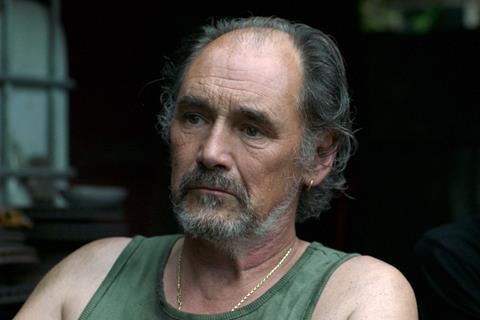Mark Rylance steps into Fridtjof Ryder’s introspective debut

Dir/scr: Fridtjof Ryder. UK. 2022. 82mins
A missing mother is the catalyst for her adult son’s tumultuous emotional journey in Fridtjof Ryder’s meditative debut. Formerly called Black Twist, part-funded by an Indigogo campaign and supported by a collection of independent production outfits including star Mark Rylance’s own Shakespeare Road, the micro-budget Inland receives its world premiere at London Film Festival, where Rylance will be its key draw. It may lean heavily into that well-worn cliche of an absent woman being the motivation for a man to find himself, but the writer/director’s arresting visual language lifts it out of a potential narrative quagmire. While it is likely too introspective for theatrical play, even with Rylance’s cachet, its folk horror elements could catch the eye of specialist outfits interested in this young director.
Freud would have a field day
While that introspection makes Inland a niche proposition, it can also be one of the film’s strengths. Ryder (who was just 20 when he shot the film in his home town of Gloucester in mid-2020) draws on elements of traditional folklore and Lynchian influences — the title bringing to mind, of course, Lynch’s own Inland Empire, also about altered states and fractured identities — to explore a psyche in distress.
In the south west England cathedral city of Gloucester, sandwiched between the beautiful landscapes of the Forest Of Dean and the Cotswolds and, an unnamed man (an enigmatic Rory Alexander) returns home from a stint in what we assume, from the white walls and concerned questions, is a psychiatric hospital. That, like much of the film, is never explicitly explained, Ryder preferring suggestion over explanation.
He briefly stays with Dunleavy, played by Rylance who signed up to the project after Ryder posted the script through his door and serves as one of numerous executive producers, as does Trudie Styler. Dunleavy acts as a concerned father figure (maybe stepfather) who offers the young man support and a job at his small garage, but he is is haunted by nightmarish visions of a forest and his mother, who has disappeared without trace. She is of Romani descent, a traditional nomadic community who have a deep connection with the natural world. Perhaps this is why the man becomes convinced that something is watching him from the trees, the woods becoming a living, breathing link between his past and present.
His increasing paranoia, and desperation for answers, leads him into encounters of varying strangeness and tone. A physical altercation with an old friend hints at past conflicts that cannot be forgotten. He engages in a passionate discussion about crisps with mechanic John (Shaun Dingwall). And in a local brothel — called, pointedly, The Fairie Queen — the man is transfixed by a parade of alabaster white statues and strikes up a connection with a sex worker he believes to be his mother. Freud would have a field day.
A dreamlike mood suggests that things may not be all they seem, but Ryder persists with this sense of ambiguity to the point of frustration. Too much relies on mother’s continual voiceover (albeit delivered in the characterful gravelly timbre of Kathryn Hunter), in which she laments how her relationship with her son is at odds with her inner self. Stronger moments come in more grounded interactions between Alexander and Rylance, the latter bringing dignity and gravitas to the role of a compassionate man who may be world weary, but wants to teach his ward how to weather the storms and keep his feet on the ground. It is a thankless task, but he perseveres in his kindness.
Ryder also effectively uses his rural setting in a way that brings to mind Mark Jenkins’ Bait or Clio Barnard’s Dark Water, with solid support from his young crew. Ravi Doubleday’s camera prowls the expanse of the forest, placing Dunleavy’s dimly-lit house in the very corner of an expansive black frame — an impossibly small sanctuary from the elements, both environmental and psychological. Bartholomew Mason’s melancholic score also draws a line between man and nature, as does the sound design; the movements of Alexander’s body often sound like the limbs of trees, creaking in the wind.
Production company: Black Twist Films
International sales: Wide, Maxime Montagne <mm@widemanagement.com
Producers: Henry Richmond, Louis Paine, Fridtjof Ryder
Cinematography: Ravi Doubleday
Production design: Ian Blackwell
Editing: Lincoln Witter, Joe Walton
Music: Bartholomew Mason
Main cast: Rory Alexander, Mark Rylance, Shaun Dingwall, Kathryn Hunter






![The Brightest SunScreen[Courtesy HKIFF]](https://d1nslcd7m2225b.cloudfront.net/Pictures/274x183/3/5/0/1448350_thebrightestsunscreencourtesyhkiff_312678.jpg)















![The Brightest SunScreen[Courtesy HKIFF]](https://d1nslcd7m2225b.cloudfront.net/Pictures/100x67/3/5/0/1448350_thebrightestsunscreencourtesyhkiff_312678.jpg)











